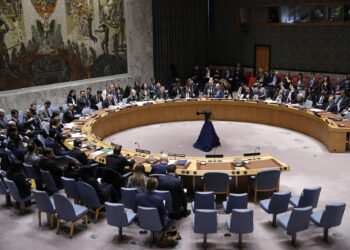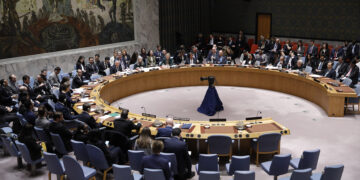Joel Beinin is the Donald J. McLachlan Professor of History and Professor of Middle East History, Emeritus at Stanford University, and a non-resident fellow at DAWN.
Joel Beinin is the Donald J. McLachlan Professor of History and Professor of Middle East History, Emeritus at Stanford University. He is also a non-Resident Fellow at DAWN.
Last July, then presidential candidate Joe Biden, responded to the release of Egyptian-American medical student Muhammad Amashah after his 486-day long detention by tweeting, "No more blank checks for Trump's favorite dictator," referring to Egypt's President Abdel-Fattah el-Sisi.
Amashah was arrested for displaying a placard with the slogan, "Freedom for all prisoners." Human Rights Watch estimates that the Sisi regime has detained as many as 60,000 political prisoners. Will president-elect Biden's apparent willingness to take a tougher line on human rights violations pressure Egyptian security authorities to relent in their pursuit of political dissidents?
The answer is mostly "no" and occasionally "yes." The 18-year old Egyptian Initiative for Personal Rights (IEPR) is one of the few independent human rights organizations still functioning in Egypt. It documents civil rights violations, prison conditions, sectarian violence, and discrimination against women and religious minorities. On November 3, the EIPR convened a meeting in Cairo with the ambassadors of thirteen western countries to brief them on the dismal state of human rights in Egypt.
The Egyptian security authorities responded by arresting three EIPR staffers between November 16 and 19: Gasser Abdel Razek (executive director); Mohamed Basheer (administrative manager); and Karim Ennarah (director of the criminal justice unit). The three were charged with "joining a terror group" and "spreading false news." In a New York Times op-ed Karim Ennarah's wife, London-based documentary filmmaker Jess Kelly, explained that her husband's arrest was "a deliberate and provocative attempt to 'move the goal posts' ahead of Joe Biden's inauguration." "The Egyptian government wants to send the message that despite paying lip service to human rights concerns, its international allies — including Mr. Biden and his new administration — would never dare to actually fight for them."
An exceptionally broad international campaign resulted in the release of the three EIPR staffers on December 3. It remains unclear if the spurious charges against them will be dropped. A fourth EIPR staffer, Patrick Zaky, who was arrested in February when he arrived in Cairo for a family visit from Bologna where he was studying for a postgraduate degree, remains in detention.
As they have previously in similar cases, Amnesty International, Human Rights Watch and EuroMed Rights, and the UN High Commissioner for Human Rights, denounced the arrests of the three EIPR staffers. More unusually, the governments of France, Ireland, Britain, and the United States issued statements of concern. Even actors Stephen Fry, Scarlett Johansson, and Emma Thompson, weighed in. President-elect Biden did not make a statement. But his Secretary of State-designate, Antony Blinken, retweeted and endorsed the State Department's expression of "deep concern."
The lesson seems clear. A massive international pressure campaign focused on specific individuals can produce positive outcomes for those individuals. Will the Biden administration learn the lesson and take up Jill Kelly's challenge to "actually fight" for human rights?
Probably not. As deputy editor-in-chief of the Lebanese daily al-Nahar, Nabil Boumonsef, told Reuters, "Biden is more flexible and rational, but I do not expect fundamental changes." More pointedly, Yemeni journalist Ibrahim Matraz reminded us not to "forget that Biden was vice president in Obama's administration when the (Saudi-UAE) war (against Yemen) began."
As the Obama administration did, we can expect the Biden administration to speak out from time to time about specific individual cases that resonate with sectors of the American public. Mohamed Soltan was imprisoned and tortured in Egypt from August 2013 to May 2015 for protesting the July 3, 2013 coup d'état that ultimately brought Abdel-Fattah al-Sisi to power. The Obama administration aggressively intervened to secure his release. Soltan was freed after a 489-day hunger strike.
In June 2020, Soltan filed a lawsuit in a US court against former Egyptian prime minister, Hazem el-Beblawy, for ordering his torture while he was detained in Egypt. In retaliation, five of his relatives were detained. They were among the 600 political prisoners released by the Cairo Criminal Court on November 3, election day in the United States.
Before the election Joe Biden spoke about the case of Muhammad Soltan's relatives. Acknowledging a reality that his more openly dictator-friendly Washington patron, President Trump, still rejects, el-Sisi congratulated Biden on his election victory on November 7. Nonetheless, Biden remained silent after the arrest of the three EIPR staffers two weeks later.
As he did in the EIPR case, Antony Blinken (assuming he is confirmed) or lower level officials will express concern about such human rights violations from time to time. The President himself will probably not do so absent truly exceptional circumstances. If the pressure is great enough, detained political prisoners may be released. Neither Blinken nor Biden will challenge the el-Sisi regime on the larger issue – that there are 60,000 political prisoners in Egypt, a praetorian dictatorship that brooks no dissent.
President Obama, no less than President Trump, viewed Egypt, and specifically, its military, as a key component of the structure of US power in the Middle East. The Obama administration tried to maintain former president Hosni Mubarak in power and opposed the demands of the January 25, 2011 popular uprising. Then Secretary of State and Biden's climate envoy-designate John Kerry refused to categorize the military's ouster of President Mohamed Morsi on July 3, 2013 as a coup. Had he done so, US law would have required that the $1.3 billion in annual military aid to Egypt be discontinued.
With the raft of Obama-era retreads about to be installed in key policy positions, it is unlikely that the Biden administration will adopt a fundamentally different perspective. That would require abandoning a foreign policy based on US global "leadership" and military power projection and a more humble and collaborative approach to international issues.
***
Image: WILMINGTON, DE November 24, 2020: President- elect Joe Biden introduces his cabinet member nominees at the Queen in Wilmington, DE on November 24, 2020. The President- elect along with Vice President- elect Kamala D. Harris introduced Antony Blinken for Secretary of State, Jake Sullivan as National Security Adviser, Alejandro Mayorkas for Secretary of Homeland Security, Avril Haines for Director of National Intelligence, John Kerry as Special Presidential Envoy for Climate, and Linda Thomas-Greenfield for U.S. Ambassador to the United Nations. (Photo by Demetrius Freeman/The Washington Post via Getty Images






































